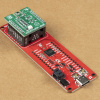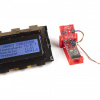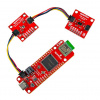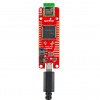After covering the basics behind using digital multimeters, I knew that I had to talk about how to supply power to a project. This week in Adventures in Science, I go over the basics of how to use a bench power supply.
Bench power supplies are extremely useful tools in testing circuits, as they allow you to adjust the voltage on the fly. If you have a project that needs a specific voltage or if you haven't quite designed the power section yet, the bench power supply can be a life saver. You can also watch the output voltage of regulators with an undervoltage lockout feature as you slowly decrease the supplied voltage to make sure it cuts off power when necessary.
Some units can be configured to act as a constant current source, and most will allow you to set a current limit. You can use this feature to characterize and test diodes (i.e., how much current flows through a diode at a particular forward voltage).
If you want to read more about powering your project, we have this fun tutorial, even if it doesn't focus solely on bench power supplies:
How to Power a Project
February 7, 2013
A tutorial to help figure out the power requirements of your project.
I know that I skimmed over the uses of the power supply in this video. Can you think of any other reasons to use a bench power supply over a simple wall adapter? Post your ideas in the comments below.
Interested in learning more foundational topics?
See our Engineering Essentials page for a full list of cornerstone topics surrounding electrical engineering.









Other reasons to use a bench supply over a wall wart? Bench supplies just look way cooler. The more indicators and digital meters you have, the more your friends and neighbors will think you're a mad scientist. When they're scared to enter your workshop, you've arrived.
I guess also the fact that you can turn off the supply without having to unplug it.
Yes. The more knobs, buttons, switches, and displays I can have on my desk, the better!
Nice! I particularly like referring to power supplies as the "gateway drug." Sorry about your wallet! :)
A bench supply has many advantages over wall warts. That bench supply will give you 5 volts when the meter says 5 volts. I've seen unloaded 5 volt wall warts output as much as 9 volts! My bench supplies will shutdown when too much current is pulled, a wall wart will go up in smoke, or your project will!
So true about the additional protections in the bench supply! Wall warts will usually drop to their rated voltage when loaded, but it may not be as accurate as the bench supply.
Programmable power supplies can be used to simulate the behavior of batteries. You can model the rate of voltage falloff due to the actual current load, for instance. This can be very helpful in figuring out how long your circuit is going to last with a given set of batteries without actually wasting the batteries themselves on a test. You can also use it to see how your circuit responds to different types of batteries, to make sure it always performs adequately, regardless of what your end-user throws at it.
If you add in a Programmable Load, you can model things like the failure points of Lithium Ion batteries, and check whether a charging circuit is performed correctly, or if it instead causes batteries to fireball without actually causing a fire hazard.
That's a good point. I forgot to mention programmable supplies! Can you recommend some that are fairly inexpensive for beginners?
I wish I could, so I could then buy it from you guys. But, given their uses, hackerspaces really aught to spring for them over the non-programmable kind; after all, who isn’t using batteries these days, and who doesn’t need to consider the voltage drop of battery drain on their circuit?
Off the top of my head, here are a few advantages to bench supplies over wall warts. They're better protected, so if you overload them, inadvertently connect them to some other voltage, etc., they'll usually survive intact: wall warts can be destroyed or blow internal fuses that are annoying to replace. They're well regulated, whereas wall warts can provide anything from DC to DC that varies with the load (I've seen double and triple the rated voltage at light load), half-wave rectified DC (basically pure ripple), or even AC. The grounding on bench power supplies is generally well-defined and explicit: the best ones are floating, so you can tie either the positive or negative output to ground, and "stack" supplies to add voltages or provide intermediate voltages. Similarly, many offer "tracking", so you can adjust multiple outputs in synchrony (useful if you happen to need equal positive and negative voltages). Here's a picture of a project that's getting a lot of use out of a triple-output power supply for circuitry that runs on several different voltages (the little boards hanging from wires in mid-air are additional regulators for yet more voltages).
All good points! That's a nice supply. After dealing with knobs, I would love to have a real number pad on my PSU :)